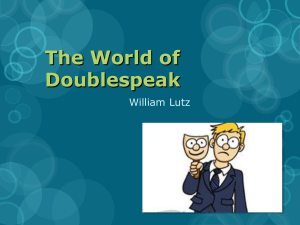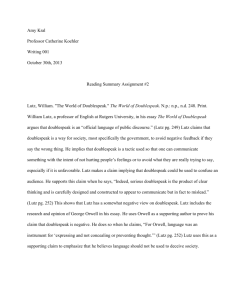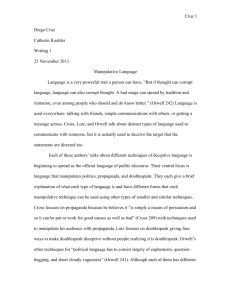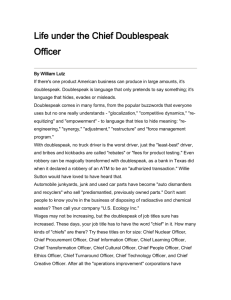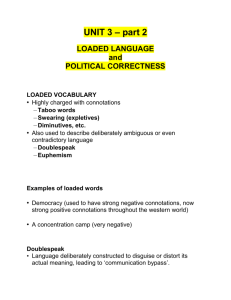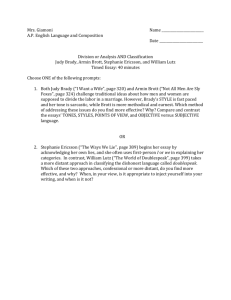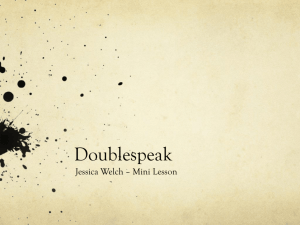Discussion Questions for “Doublespeak: Nothing in Life is Certain Except... Outcome and Revenue Enhancement” by William Lutz
advertisement
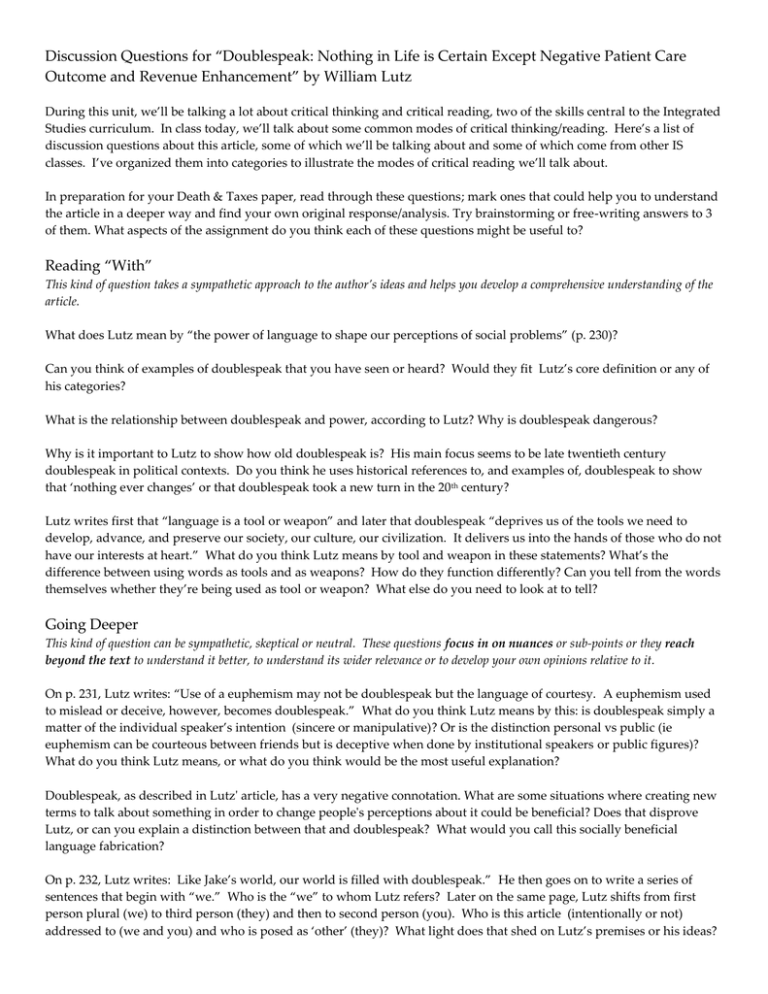
Discussion Questions for “Doublespeak: Nothing in Life is Certain Except Negative Patient Care Outcome and Revenue Enhancement” by William Lutz During this unit, we’ll be talking a lot about critical thinking and critical reading, two of the skills central to the Integrated Studies curriculum. In class today, we’ll talk about some common modes of critical thinking/reading. Here’s a list of discussion questions about this article, some of which we’ll be talking about and some of which come from other IS classes. I’ve organized them into categories to illustrate the modes of critical reading we’ll talk about. In preparation for your Death & Taxes paper, read through these questions; mark ones that could help you to understand the article in a deeper way and find your own original response/analysis. Try brainstorming or free-writing answers to 3 of them. What aspects of the assignment do you think each of these questions might be useful to? Reading “With” This kind of question takes a sympathetic approach to the author’s ideas and helps you develop a comprehensive understanding of the article. What does Lutz mean by “the power of language to shape our perceptions of social problems” (p. 230)? Can you think of examples of doublespeak that you have seen or heard? Would they fit Lutz’s core definition or any of his categories? What is the relationship between doublespeak and power, according to Lutz? Why is doublespeak dangerous? Why is it important to Lutz to show how old doublespeak is? His main focus seems to be late twentieth century doublespeak in political contexts. Do you think he uses historical references to, and examples of, doublespeak to show that ‘nothing ever changes’ or that doublespeak took a new turn in the 20th century? Lutz writes first that “language is a tool or weapon” and later that doublespeak “deprives us of the tools we need to develop, advance, and preserve our society, our culture, our civilization. It delivers us into the hands of those who do not have our interests at heart.” What do you think Lutz means by tool and weapon in these statements? What’s the difference between using words as tools and as weapons? How do they function differently? Can you tell from the words themselves whether they’re being used as tool or weapon? What else do you need to look at to tell? Going Deeper This kind of question can be sympathetic, skeptical or neutral. These questions focus in on nuances or sub-points or they reach beyond the text to understand it better, to understand its wider relevance or to develop your own opinions relative to it. On p. 231, Lutz writes: “Use of a euphemism may not be doublespeak but the language of courtesy. A euphemism used to mislead or deceive, however, becomes doublespeak.” What do you think Lutz means by this: is doublespeak simply a matter of the individual speaker’s intention (sincere or manipulative)? Or is the distinction personal vs public (ie euphemism can be courteous between friends but is deceptive when done by institutional speakers or public figures)? What do you think Lutz means, or what do you think would be the most useful explanation? Doublespeak, as described in Lutz' article, has a very negative connotation. What are some situations where creating new terms to talk about something in order to change people's perceptions about it could be beneficial? Does that disprove Lutz, or can you explain a distinction between that and doublespeak? What would you call this socially beneficial language fabrication? On p. 232, Lutz writes: Like Jake’s world, our world is filled with doublespeak.” He then goes on to write a series of sentences that begin with “we.” Who is the “we” to whom Lutz refers? Later on the same page, Lutz shifts from first person plural (we) to third person (they) and then to second person (you). Who is this article (intentionally or not) addressed to (we and you) and who is posed as ‘other’ (they)? What light does that shed on Lutz’s premises or his ideas? The Questioning Read This type of question is similar to a “constructive critique.” It’s not hostile to the text, but it approaches the text with a degree of skepticism. Like “reading with,” It is useful to do this with texts you agree with as well as ones you disagree with. Three common things to ask about when of doing a “questioning read” are context, premises and conclusions. What political, social or historical circumstances surrounded the author at the time of writing? What presumed truths seem to underlie the text? These are often connected. Here are some questions about this article’s context, premises and conclusions (in that order). How do you think this article reflects the time period in which it was written and the author’s generation? How does it seem to reflect the society in which it was written? How does this article reflect the political and cultural “stance” of the author? What underlying assumptions about good and bad, positive and negative, and the nature of reality form the basis of Lutz’s definition of doublespeak? Do you agree with these assumptions? Why or why not? Can you think of instances where an audience might INTERPRET language as doublespeak even when it was NOT intended that way? Are courtesy and deception necessarily mutually exclusive? Can courtesy involve misleading statements or deception? Why or why not? Can you think of examples of “the power of language to shape our perceptions of social problems” (p. 230) that do NOT constitute doublespeak? Or examples of doublespeak that are socially productive? Do you agree with Lutz’s assessment of the dangers of doublespeak? Why or why not? Taking it Further This type of question asks about the text’s relevance to something beyond the text. For example, it might help you see whether it relates to you or your social context, or to a larger social issue, or to a culture or social group that the text didn’t address. How do you think the Internet and other forms of technology have influenced doublespeak in recent years? How else would you update Lutz’s theory for the present social environment? How might the concept of doublespeak relate to artistic expression? Can art be employed in the service of doublespeak? Can art be used as a means of exposing or resisting doublespeak? How does an understanding of doublespeak help “to make informed judgments and choices as an expression of civic responsibility and engagement” (one of the H&S departmental goals)? How is the concept of doublespeak related to political freedom? What connections can you draw between doublespeak and Constitution Day or Banned Books Week?
